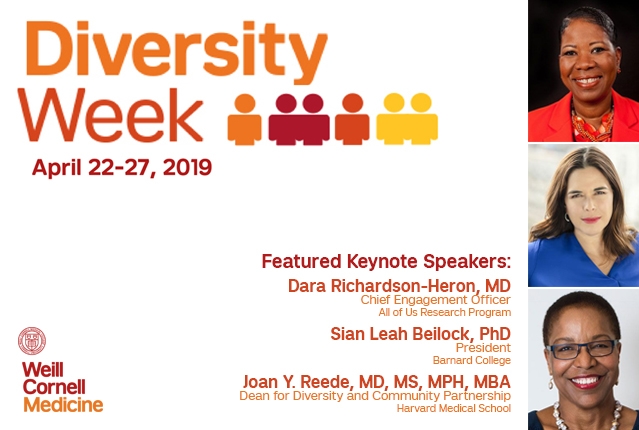Weill Cornell Medicine kicked off its second annual Diversity Week on April 22, celebrating the varied backgrounds and perspectives that enrich the institution’s community.
The initiative, which launched last year, runs through April 27. It includes more than 40 activities, from grand rounds to workshops to panel discussions, aimed at highlighting scholarship and projects designed to increase diversity and reduce disparities in healthcare at Weill Cornell Medicine and at academic medical centers across the country.
“We are thrilled to have an outstanding roster of nationally renowned speakers, a lively schedule of lectures and events, and many members of our institution sharing their expertise,” said Dr. Augustine M.K. Choi, the Stephen and Suzanne Weiss Dean of Weill Cornell Medicine. “Weill Cornell Medicine is extremely proud to be a community of diverse individuals—and delighted to be hosting a second extraordinary Diversity Week.”
Three keynote speakers headline Diversity Week. Dr. Dara Richardson-Heron, chief engagement officer of the All of Us Research Program, a cornerstone initiative of the National Institutes of Health, spoke on April 22 on “The Importance of Diverse Representation in Clinical Research: The All of Us Research Program.”
Dr. Sian Leah Beilock, president of Barnard College, will deliver her keynote address on April 24 on “Enhancing STEM Success for Women and Girls.”
And Dr. Joan Y. Reede, dean for diversity and community partnership at Harvard Medical School, will deliver the first annual Elizabeth A. Wilson-Anstey, EdD Lecture from 12-1 p.m. on April 25 on “Diversity Inclusion: The Time is Now.”
“Diversity and inclusion are our essential values at Weill Cornell Medicine,” said Dr. Said Ibrahim, senior associate dean for diversity and inclusion. “We are guided by Dean Choi’s vision to make Weill Cornell Medicine a leader in this area. With numerous pipeline programs and initiatives dedicated to increasing underrepresented faculty, trainees and students, we are committed to building a core inclusive academic community.”
“Our hope,” he added, “is that the dean’s Diversity Week will not only help us promote an internally facing culture of diversity and health equity, but will also elevate the conversation locally and regionally, thus reminding the greater community of New York that that we care about them.”
Diversity Needs to be Embedded in Policies, Practices
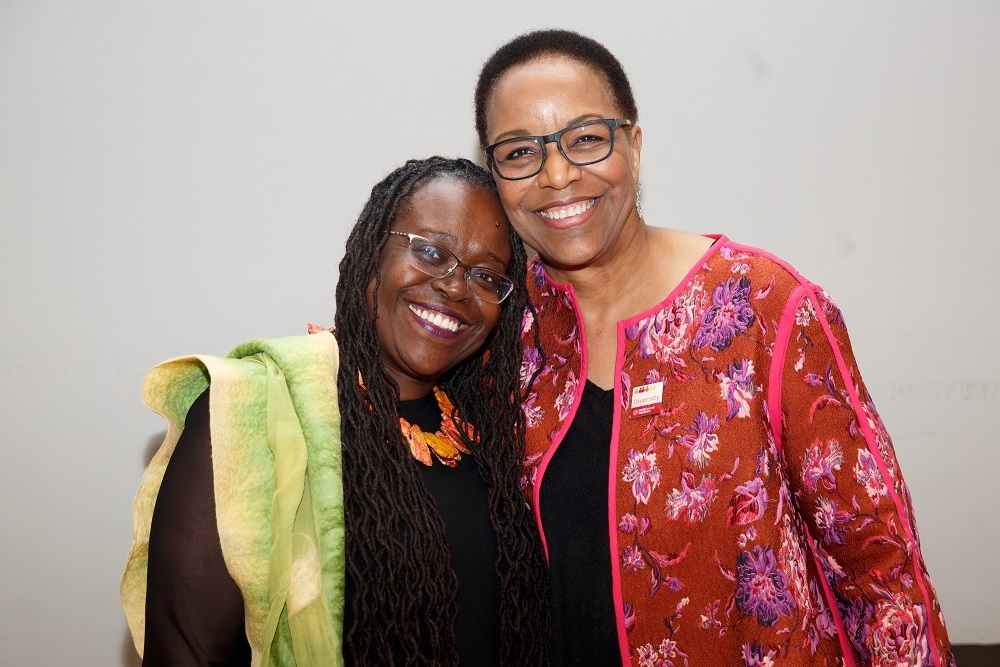
From left: Dr. Elizabeth Wilson-Anstey and Dr. Joan Y. Reede, dean for diversity and community partnership at Harvard Medical School, during Diversity Week on April 25, 2019. Credit: Ashley Jones
The statistics are sobering: Out of the more than 170,000 faculty in U.S. medical schools, there are approximately 200 black female full professors. In leadership positions, there are fewer than 20 black female and 30 Hispanic female clinical chairs, and about 30 Asian female clinical chairs. Overall, a higher percentage of underrepresented minorities—those who self-report as black, Hispanic, Native American, Alaskan Native, Native Hawaiian or Pacific Islander—serve as deans in medical schools compared with URM as a percentage of faculty, but Asian representation still lags among deans.
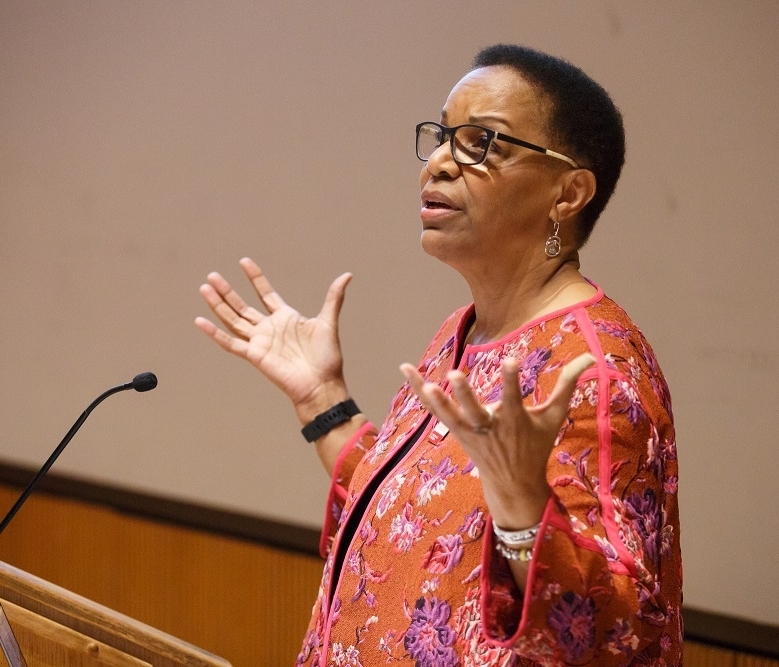
Dr. Joan Y. Reede delivers her keynote address on April 25, 2019. Credit: Ashley Jones
Changing this picture requires diversity to be woven into the fabric of policies and procedures at medical schools, said Dr. Joan Y. Reede, dean for diversity and community partnership at Harvard Medical School and the inaugural speaker for the Elizabeth A. Wilson-Anstey, Ed.D., Lecture at Weill Cornell Medicine.
“Until we have diversity inclusion—the embedding of diversity in our policies, our practices, our programs—we will never achieve diversity and inclusion,” Dr. Reede said on April 25 as the third keynote speaker for Weill Cornell Medicine’s second annual Diversity Week. “Diversity cannot be something that we do on the side while we fulfill the rest of our mission. It must become a part of our mission.”
Inclusion, Dr. Reede said, means that underrepresented minorities not only have a seat at the table, but are also part of the discussion and decision-making in determining the direction organizations go. She also discussed the messages that young people of color receive about their appearance that act as barriers to pursuing science and medical careers, as well as barriers such as tokenism, isolation and exclusion that many people of color face in the workplace. Overcoming these barriers, Dr. Reede said, requires creating communities within organizations to offer support and create change.
“We are all going to be challenged to recruit, nurture, retain and advance a diverse workforce,” Dr. Reede said. “This is not an option for our survival. We need to make sure that the individuals in our workforce feel valuable, valued and comfortable, and that they can contribute and will be respected for their contribution.”
Getting Out of Your Own Way: Performing Under Pressure
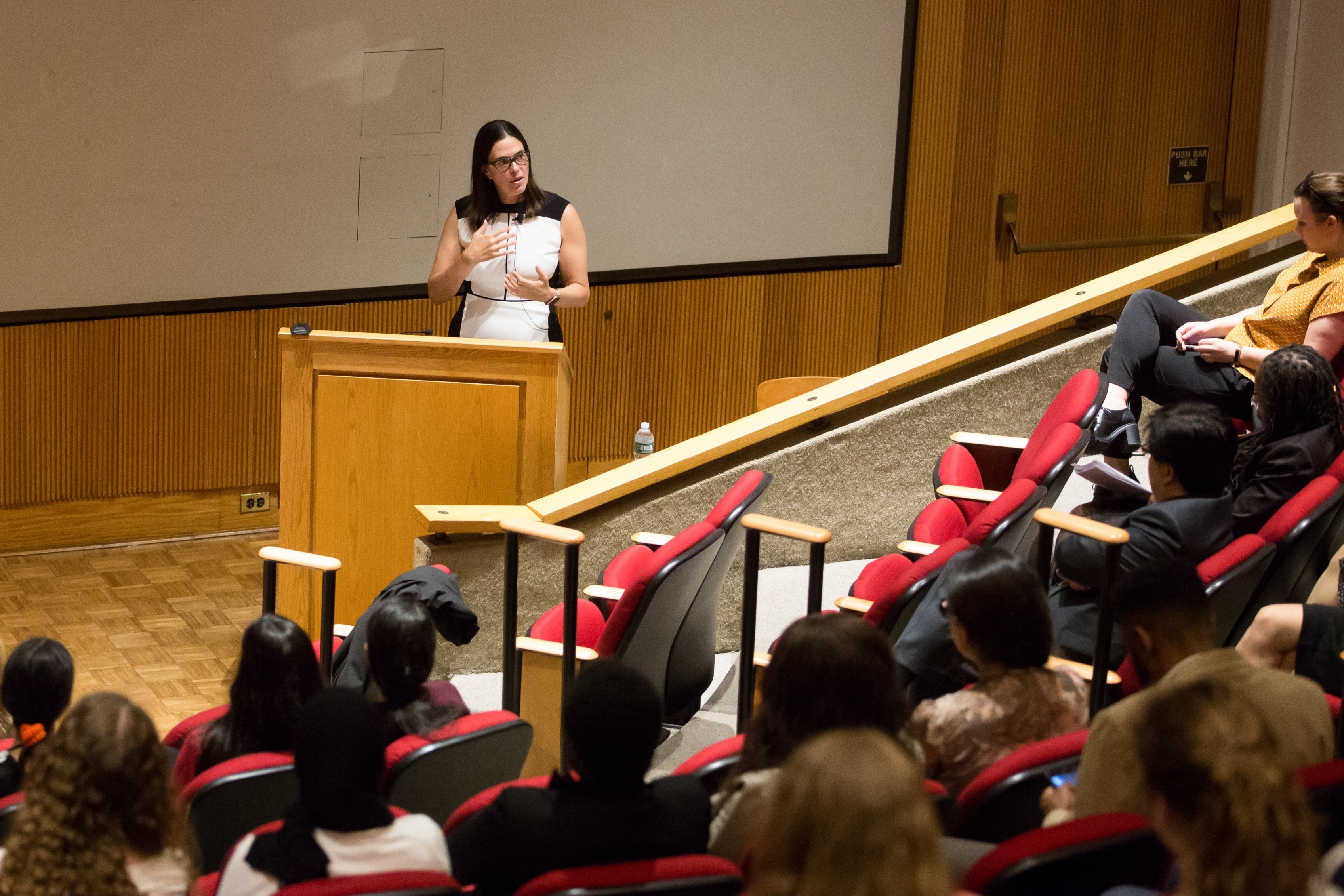
Dr. Sian Beilock, president of Barnard College, gives a keynote address at Weill Cornell Medicine during Diversity Week on April 24, 2019. Credit: Ashley Jones
Dr. Sian Beilock wants to help people perform better in high-pressure situations. A cognitive scientist, she studies the brain and the body as people learn and perform, and what happens when they don’t achieve their potential.
The anxieties and pressures that people feel, particularly women and girls, in performance situations like test taking and public speaking can come from a variety of sources, such as societal gender expectations and the pressures women and girls put on themselves.
“What happens in the brain when we are under pressure is the frontal cortex goes awry,” said Dr. Beilock, president of Barnard College, who spoke on April 24 at Weill Cornell Medicine as part of the institution’s second annual Diversity Week. “We often focus too much on the details of what we’re doing. And we have these blinders on, so we’re not able to make these more out-of-the-box decisions.”
She also notes that our ability to communicate effectively can break down in pressure-filled situations, such as offering ideas in an important meeting, which can then stunt a person’s ability to successfully express their thoughts. And permeating all of this is the fact that “we worry,” Dr. Beilock said. “We worry about the situation; we worry about its consequences.”
Through her research, Dr. Beilock has developed key techniques for overcoming the obstacles of high-pressure situations. Her tips for success include adequate preparation for the kinds of stresses that may occur in the moment, such as overthinking or “paralysis by analysis,” practicing in front of others, and changing one’s mindset to focus more on the positive. She also notes that teachers and parents can play important roles, supporting young girls as they learn about math and science to reduce “math anxiety,” feelings that can often be learned in school from the teachers themselves.
Dr. Beilock also stresses the importance of putting diverse groups together, especially in science and medicine, to produce good decisions and outcomes. “Collective intelligence is this idea that it’s not the individual knowledge or intelligence or expertise of any one group member that leads to the best outcome,” she said. “It’s how people come together. That involves having people with different perspectives, from different backgrounds. It involves having both men and women in the room.”
Ultimately, the key is finding the right tools for achievement under pressure. “Our environment dictates often how we’ll feel, but we have the ability to control our thoughts to actually perform up to our potential,” Dr. Beilock said. “And just like anything else, you can train yourself to do well in these stressful situations.”
Diversity and Inclusion Vital in Medical Research

Dr. Dara Richardson-Heron, chief engagement officer of the All of Us Research Program (second from right), with leaders from Weill Cornell Medicine's Office of Diversity and Inclusion. From left: Dr. Elizabeth Wilson-Anstey, Dr. Linnie Golightly, Dr. Rache Simmons, Dr. Said Ibrahim and Dr. Marcus Lambert. Credit: Ashley Jones
To Dr. Dara Richardson-Heron, the transformative nature of the All of Us Research Program, the National Institutes of Health’s cornerstone precision medicine program, is exemplified in its name.
“I have seen the healthcare system from so many different vantage points, but I am beyond excited about the promise of the All of Us Research Program and its potential to change the face of research, health and healthcare as we know it,” said Dr. Richardson-Heron, chief engagement officer of the NIH program and the first keynote speaker to kick off Weill Cornell Medicine’s second annual Diversity Week, which runs from April 22-27. “But it will truly take all of us.”
Officially launched in 2018, the All of Us Research Program is an initiative that seeks to advance individualized prevention, treatment and care for people of all backgrounds. The goal is to enroll 1 million or more participants from around the country—75 percent to come from communities that have been historically underrepresented in medical research—to make the program the largest, most diverse resource of its kind.
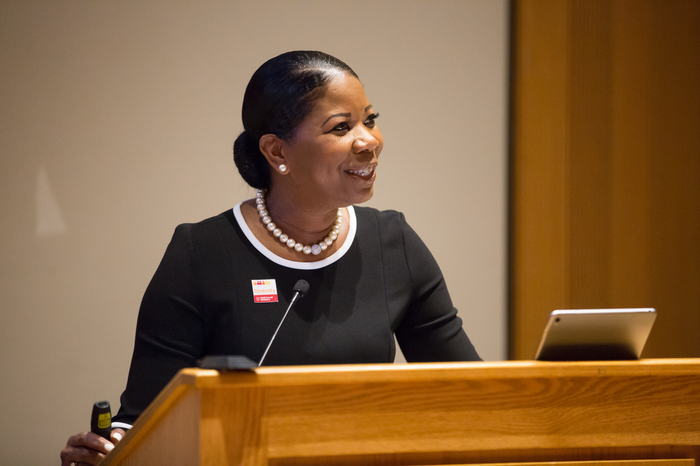
Dr. Dara Richardson-Heron delivers her keynote address on April 22, 2019. Credit: Ashley Jones
Dr. Richardson-Heron recognizes that there may be skepticism about participating in the program among people whose communities in the past have been exploited or excluded from medical research. The All of Us Research Program is tackling those issues head-on, working with trusted community organizations, key stakeholders and the participants themselves to rebuild trust and ensure that those unethical instances will never happen again, she said.
“Our job is, first, to be authentic and honest about the transgressions from the past,” Dr. Richardson-Heron said. “And then, genuinely, with overwhelming respect and empathy, acknowledge the legitimate fears, concerns and mistrust these unfortunate actions instilled in many communities.
“Simultaneously,” she added, “we must share the great news that research has the potential to be a powerful change agent, one with the potential to begin chipping away at health disparities as we know it. The only way we can learn about and one day eliminate health disparities is to have a much more robust and diverse participation in research and clinical trials.”
Currently, people of color comprise 38 percent of the United States’ total population but fewer than 10 percent of clinical trial participants. By contrast, New York City’s All of Us consortium, led by Weill Cornell Medicine, Columbia University Irving Medical Center, NYC Health + Hospitals/Harlem and NewYork-Presbyterian, has enrolled into the program nearly 14,000 people—84 percent of whom hail from underrepresented communities.
“Increasing diversity in biomedical research will enable scientists and researchers to learn more, over time, about the interconnections between our races, our ethnicity, our lifestyles, our environment and our biology,” Dr. Richardson-Heron said. “This, in turn, may help foster scientific discoveries and get us to a place where we can enhance prevention. So if we do get sick, this knowledge will help us identify the right treatment for the right person at the right time, every time.”

